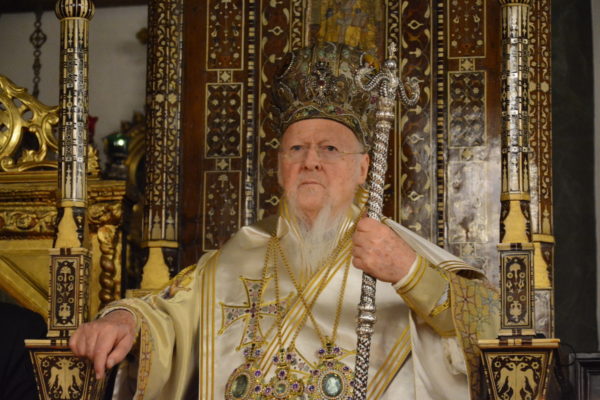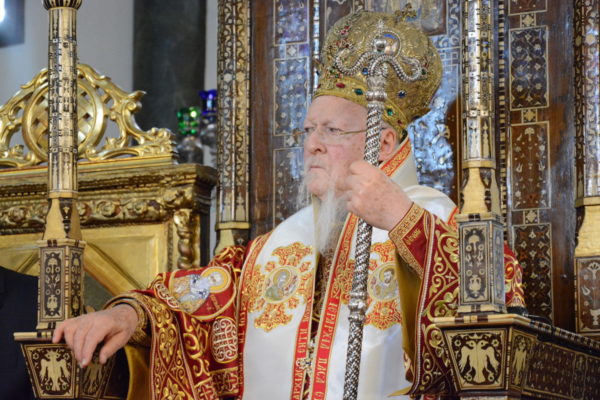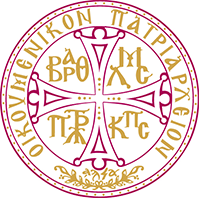Your Serene Highness,
Your Excellencies,
Your Eminences,
It is indeed an immense joy and privilege to address all of you, distinguished and esteemed audience. And—on behalf of our entourage and community, both local and international—we are grateful and touched by the generous hospitality of His Serene Highness Prince Albert II, whose sincere concern for creation care is inspirational to all of us. We are especially honored by his presence here today.
The mission statement of Oceanographic Museum of Monaco notes that “the ocean is one; that it is global and that it unites the whole world . . . as well as that our history and our future are intimately linked on our blue planet.” Therefore, we cannot imagine a more immediate connection between the policy of your museum and the practice of our church, as we have advocated and advanced the protection of the environment over the last decades. Precisely because in addressing the ecological crisis, the Ecumenical Patriarchate has affirmed and underlined the interconnectedness of all creation and all people, as well as of heaven and earth. By means of all our initiatives and programs throughout our humble tenure for the last thirty-two years, we have sought to implement the mystical vision of St. Maximus the Confessor, who spoke in the seventh-century of the entire world as a “cosmic liturgy.” This is what the term “universe” signifies – namely, that everything tends toward unity, that all things are inclined toward harmony, integrity and solidarity. Wherever and whenever we see separation and division, alienation and conflict, we also witness exploitation and pollution, corruption and destruction. Most recently, we behold this painful truth in the wake of the barbarous invasion of Ukraine by the Russian Federation, but also at this very time in the light of the tragic loss of innocent life in the Middle East. We shall return these conflicts in a moment.
Allow us, however, briefly to introduce the vision or worldview of the Orthodox Church regarding the sacred gift of creation and the divine command “to serve and to preserve” (Genesis 2.15) the natural environment. In so doing, we shall also explain how we have endeavored to raise awareness about the plight of our planet.
First of all, from the outset of our ecological program – indeed, even from the time of our predecessor, the late Ecumenical Patriarch Demetrios – we have underlined the spiritual nature of climate change. The challenge that we face is not only scientific or technological; it cannot be resolved simply through political or conservational changes; and it should not be reduced to a secular or commercial problem. While it is all of these, the global warming is above and beyond everything else a spiritual matter. It is related to the way we perceive; because the way that we see the world will determine the way that we treat it. This is why religion has a unique role to play in addressing environmental issues. Further, this is why we have persistently proclaimed the primacy of spiritual values in addressing climate change and determining environment ethics. This is also why we have repeatedly underlined the abuse of our planet’s natural resources as tantamount to sin. In this context, since 1989—long before it became familiar or fashionable—the Orthodox Church instituted a call to prayer for the protection of the natural environment. We even commissioned a special service that was composed by the late Fr. Gerasimos of Mount Athos, who was canonized only a few months ago by our Holy Synod.
Secondly, from the outset of our ecological initiatives, we have proclaimed and promoted an inter-religious and inter-disciplinary response to climate change. In numerous seminars, symposia and summits over the last thirty years—in Türkiye and abroad, on the Aegean and the Black Seas, along the Danube and the Mississippi Rivers, as well as in Greenland and the Amazon—we have gathered a wide range of religious and political authorities, corporate and civil leaders, theologians and scientists, economists and ethicists, academicians and intellectuals, along with journalists and laypersons to converse and concentrate together on what needs urgently to be done in order to protect the world for future generations. To this end, we have partnered with the United Nations and the European Parliament, as well as the Vatican and the Anglican Communion, but also global celebrities like former United States Vice-President Al Gore, renowned primatologist Jane Goodall and economist Jeffrey Sachs. Because would it not be tragic if our generation were to leave behind a world in worse condition than that in which we received it? Only we can make that decision; only we can make that change; but we can only do it if we act in humility and unity.
Finally, what we have learned over the last decades, is that environmental issues are intimately and inseparably connected to and dependent on numerous other social challenges of our times. It is not by chance that the term “eco-justice” has been coined in ecumenical circles to describe this interconnection between creation and creatures, between the world and its inhabitants. As we have repeatedly underlined, the way we treat the world around us inevitably affects the way we treat our brothers and sisters. Therefore, climate change has an immediate impact on questions of economy and especially poverty, as well as of human rights and especially immigration. All of these provide a human face to any abstract worldview.
One other human and humanitarian consequence—we might even speak of a human and humanitarian cost—of the ecological crisis is the scandal of military conflict and aggression. In recent months, we have observed the destruction of human life and devastation of the natural environment in the unjustified and unprovoked invasion by Russia on the sovereign territory of Ukraine. It has been personally and globally painful, both tragic and reprehensible, to witness the Russian Federation—with the shameless support and endorsement of the Russian Church—eliminating human lives and obliterating natural environments that will be lost forever to our world and to our children. Nobody has the right to cause such inconceivable and irreparable damage, both human and environmental. We unequivocally and outrightly condemn this war—as well as its heretical and hypocritical justification by its perpetrators—even as we call for peace and reconciliation between the neighboring nations that share so much history and culture. If we really care about God’s creation, then we cannot be indifferent to what is occurring before our eyes in Ukraine.
At the same time, before our very eyes, we have seen the devastating loss of countless innocent lives, along with the destructive loss of structures and infrastructures in the Middle East, where the seemingly perpetual conflict has recently flared up again precisely because as human beings we are unwilling to collaborate and concede, unable to sacrifice and serve for the benefit of our brothers and sisters as well as for the protection of God’s sacred gift creation. In the past, together with our dear brother Pope Francis, we endeavored to bring together and bring to dialogue the leaders of both Israel and Palestine. And only days ago, we issued a strong statement against the use of violence allegedly to establish peace.
Dear friends, we therefore urge you to keep these three principles close to your heart: 1) that our response to climate change begins in our heart, in our home, and in our community; 2) that all of us are in this together, that all of us share responsibility for our planet; and 3) that what we do for our planet has direct repercussions on our fellow human beings.
Once again, we thank you for the opportunity to share with you our vision and policy with regard to preserving the invaluable and sacred gift of God’s creation. Thank you also for your kind attention.





